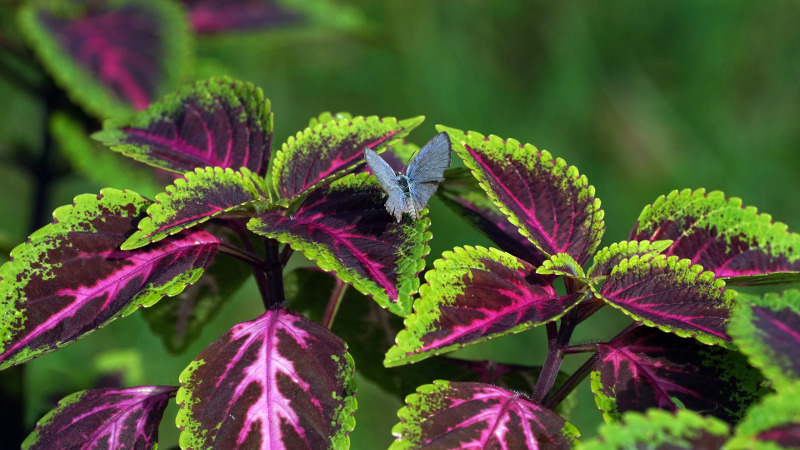Coleus is a stunningly beautiful plant, but it is also poisonous to humans and pets. The leaves of Coleus can cause a rash and lead to a variety of health issues if consumed. Coleus has low poison toxicity, and it is rarely fatal; however, it is still crucial to be aware of the threat and be careful if you have the plant in the presence of children and pets.

Are Coleus Poisonous to Children
Coleus is not edible, the leaves are mildly toxic, and eating the foliage can cause gastrointestinal distress. Touching the plant can cause a slight allergic reaction in the form of dermatitis or a red rash. The rash usually goes away rather quickly; however, if the inflammation persists or becomes worse, you should contact your child’s pediatrician.
Are Coleus Poisonous to Dogs
Coleus is poisonous to dogs, and while the plant is not likely to be fatal if eaten, it can cause a reaction and illness. The leaves of Coleus contain diterpene coleonol and coleon O, which are toxic to dogs. Pets that ingest Coleus foliage may experience vomiting, diarrhea, and depression.
Are Coleus Poisonous to Cats
Yes, the Coleus plant is poisonous to cats. The plant has low toxicity for cats and kittens, so eating Coleus is unlikely to be fatal, but you may want to ensure your pets cannot come into contact with the plant. It is safe to grow Coleus outdoors if you have house cats, but you may not want to grow the plant as an annual and bring it inside for the winter. Symptoms of eating Coleus for cats include vomiting, upset stomach, and diarrhea.
Are Coleus Poisonous to Other Animals
Coleus is confirmed to be poisonous to horses. The leaves of the Coleus have low toxicity and will cause a horse to experience diarrhea and vomiting.
Symptoms of Coleus Poisoning
Always check with your doctor or veterinarian for guidance if you suspect Coleus poisoning. Here are some common symptoms to look out for:
- Vomiting
- Diarrhea
- Depression
Preventing Coleus Poisoning
Physical barriers and fences are solutions to prevent children, pets, and other animals from coming into contact with Coleus. You may want to plant Coleus in beds or containers that are not accessible to pets. For instance, if your dog only has access to a fenced-in backyard, then it may be okay to have a potted Coleus on a front porch. Keeping the plants outside may be a good solution for house cats. Although, it is essential to consider that other animals may still have access; so you should do what you think is best.
It is possible to overwinter Coleus plants indoors, but if you suspect curious pets may be tempted to inspect or eat the leaves, then it may be best not to bring the plant inside.
Pet Poison Helpline
If something were to happen to your furry friend, and you suspect that they are suffering from Coleus poisoning, there is a poison control hotline to call for 24/7 vet advice. It is called the Pet Poison Hotline, and their phone number is (855) 764-7661.
Click here for a complete list of Pet Safe Plants.
Sources:
"Coleus." American Society for the Prevention of Cruelty to Animals. aspca.org
"Coleus scutellarioides." The North Carolina Extension Gardener Plant Toolbox. plants.ces.ncsu.edu.
 |
Author Alison Cotsonas - Published 12-07-2021 |


